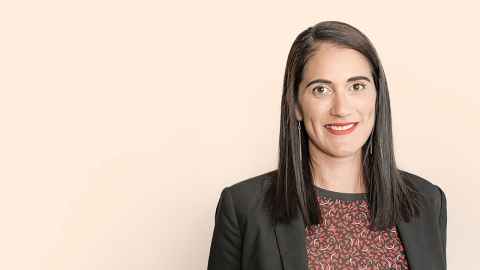Te Aopare Dewes
Te Aopare Dewes leads Chapman Tripp’s Māori legal group, Te Waka Ture. From Ngāti Porou and Ngāti Rangitihi iwi, Te Aopare is a fluent speaker of te reo Māori. She is a corporate and commercial partner, a mother of two and a strong advocate for flexible work arrangements. She is on the steering committee of the University of Auckland Business School Māori Business Leaders Awards.

Ask Te Aopare Dewes what her proudest achievement over the past year has been and she replies: the birth of her daughter in August 2020, and managing the baby alongside the needs of her toddler son.
“It’s been a busy year,” she says. “I have had to remind myself not to sweat the little stuff, to focus on the long game.”
Te Aopare is now back at work at Chapman Tripp and is undoubtedly a role model for women, particularly young Māori women, thinking of a legal career.
“The Covid lockdowns have certainly helped shift mindsets,” she says.
“We have the IT systems and hardware in place and we know how to do a Zui (Zoom Hui). Flexible working will allow more women like myself to continue to stay in private practice while raising a young family. I would hope that the flow-on effect will be more female partners in law firms.”
Te Aopare grew up in Rotorua and went to Kohanga Reo and Kura Kaupapa Māori, “so I knew that whatever I did it would be some form of service to Māori communities and Māori interests”.
She knew a number of lawyers who were working for the betterment of Māori communities: “my dad (Whai Dewes), my uncle Rawiri Rangitauira, Annette Sykes, Justice Sir Joe Williams – to name a few”.
“I saw first-hand the law being used as a tool to help progress Māori interests.
So that’s why, as a 17-year-old, I chose to do law.”
At the University of Auckland, Te Aopare studied for a Law and Science conjoint.
“In Science, I majored in Biological Sciences and had the opportunity to do a summer studentship under Dr Michael Walker. He taught me that the kaupapa Māori lens can be applied in all areas.”
At law school she had a number of female mentors. “These wahine Māori taught me to be a critical thinker, to work hard, to lead with empathy and compassion, and to support others (including as a senior law student, supporting first and second-year law students).”
Since joining Chapman Tripp in 2010, Te Aopare has worked with iwi and Māori land clients, including Ngāti Whātua Ōrākei on their Treaty settlement, Ngati Porou Forests on their carbon forestry project, and 12 iwi that came together to form the Iwi Collective Partnership to collectivise fishing assets.
She has also contributed to the fabric of Chapman Tripp by normalising the recognition of mana whenua - “at our new offices in Commercial Bay, the names for our meeting rooms were gifted to us by Ngāti Whātua Ōrākei” - normalising the celebration of Matariki and te wiki o te reo Māori, and arranging beginner te reo classes for all staff.
“I am also proud to be contributing to the development of young Māori commercial lawyers,” she says.
Looking to the future, Te Aopare is concious of continuing to be a role model for other female lawyers who are aspiring to be a partner with a young family.
“And personally, I want to continue to improve my te reo Māori, and ensure that my children and grandchildren are fluent in te reo Māori.”